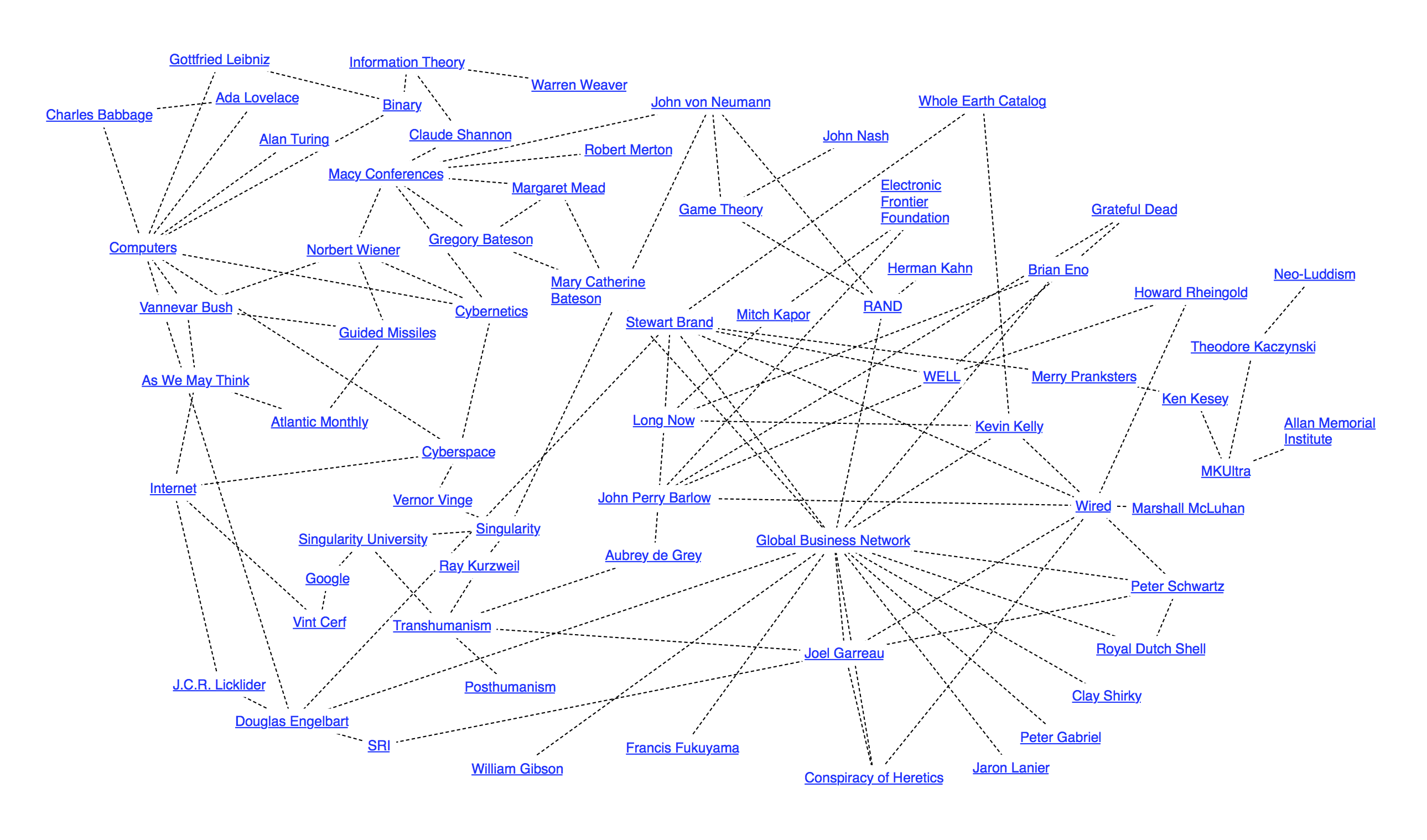SOCI221/2AA – Sociology of Cyberspace
Meeting 2: History
September 15, 2014
Slides: http://slides.com/enkerli/soci221mtg2
Logistics
- Online texts
- Need to be on campus, in most cases
- Can download all at once
Can do VPN http://lar.me/vpnconu - Also coursepack volume, H–1132, library…
- References on Moodle
Work for the Course
- Contributions (degree of engagement, putting yourself in…)
- Reflection posts (working with material, sharing insight…)
- Activities (hands-on, put into practice…)
- Exams (define concepts, explain position, contrast terms…)
Podcasts
- CBC Spark: http://lar.me/1an
- The Broad Experience: http://lar.me/2–8
- Place de la toile: http://lar.me/1ao
- Twit.tv network (This Week in Tech)
- 5by5.tv network
- Relay.fm network
- Tummelvision.tv
This Past Week
-
“Productivity is for machines. If you can measure it, robots should do it.” – Kevin Kelly, via Stowe Boyd http://lar.me/1at
Online History Activity
- Noticed Patterns?
- What has changed?
- Has society changed in sync?
Required Texts
- Bush, Vannevar. “As We May Think.” Atlantic Monthly, 1945. http://lar.me/2z8
- Leiner, Barry M. et al. “A Brief History of the Internet.” ACM SIGCOMM Computer Communication Review 39, no. 5 (2009): 22. doi:10.1145/1629607.1629613. http://lar.me/2–9
Vannevar Bush
Bush, Vannevar. “As We May Think.” Atlantic Monthly, 1945. http://lar.me/2z8
Technology and Prospective
- War context
- Knowledge Management
- Power of intellect
- Shoulder of Giants
- Scale
End of an Era?
- Industrial Era
- Productivity
- Rationality
- Post-industrial
- Hyperproductivity
- Knowledge work (call centres…)
- Information Overload
- Getting Things Done (GTD) http://lar.me/2-a
Engineering mindset
- Human/machine
- Creativity
- Sir Ken Robinson TED talk: http://lar.me/1av
Inspiration
- DouglasEngelbart
- NYTimes.com http://lar.me/2z5
- 1968 Demo http://lar.me/2z6
- Bret Victor
- Inventing on Principle http://lar.me/cusec
- “The Future of Programming” http://lar.me/2z7
- Apple Knowledge Navigator http://lar.me/2z9
Leiner et al.
Leiner, Barry M., Vinton G. Cerf, David D. Clark, Robert E. Kahn, Leonard Kleinrock, Daniel C. Lynch, Jon Postel, Larry G. Roberts, and Stephen Wolff. “A Brief History of the Internet.” ACM SIGCOMM Computer Communication Review 39, no. 5 (2009): 22. http://lar.me/2–9
Internet Infrastructure
- Plumbing
- Commodity
- Reliability
- Scalability
- Flow
- Information Technology
- Academics
- Open publication
- Vendors and inventors
Internet Infrastructure
- Beyond Web
- Finances
- Social aspect
- Community
- Political Aspect
- Who decides?
- “Core group of designers”
- Global Inequalities
- Who decides?
Sociology Crash Course
- WMDs: Weber, Marx, Durkheim http://lar.me/wmd
- Symbolic Interactionism, Conflict Theory, Functionalism
- Dialogue, Inequality, Stability
- Group, socialization, role, status…
- Power, control, conformity, norms, deviance
- Culture, subculture, counterculture
- Feminism as key
Cyberspace Background
Cyberspace Precursors
- Gottfried Wilhelm Leibniz
- Ron Eglash on African fractals http://lar.me/281
- Charles Babbage
- Alan Turing
- Norbert Weiner 1948 “Cybernetics”
- J.C.R. Licklider 1962 “Intergalactic Computer Network”
- Vernor Vinge 1981 “Cyberspace”
Macy Conferences
The Macy Conference Core
- http://lar.me/2za
- Gregory Bateson
- Lawrence K. Frank
- Frank Fremont-Smith
- Margaret Mead
- Arturo Rosenblueth
- Warren McCulloch
The Macy Conference Attendees
- Lawrence Kubie
- Walter Pitts
- Paul Lazarsfeld
- John von Neumann
- Norbert Wiener
- Clyde Kluckhohn
- Roman Jakobson
- Claude Shannon
Macy Subconference
- Talcott Parsons
- Robert Merton
Making Links
Next Week
Cultural Background
Online Exercise/Activity: Before and After
- Pick a topic related to social change in an online world (education, dating, labour, publishing, networking…).
- Find someone who lived through a transition to an online world.
- Ask that person about the change topic, describing a bit of the context for the course.
- Share a quick piece of insight from that interaction, not giving away any personal detail.
Required Texts
- Silver, David. “Looking Backwards, Looking Forward; Cyberculture Studies 1990–2000.” Web Studies: Rewiring Media Studies for the Digital Age. Oxford University Press, 2000. http://rccs.usfca.edu/intro.asp
- Turner, Fred. “Where the Counterculture Met the New Economy: The WELL and the Origins of Virtual Community.” Technology and Culture 46, no. 3 (2005): 485–512. doi:10.1353/tech.2005.0154. http://lar.me/2zb
Silver
Silver, David. “Looking Backwards, Looking Forward; Cyberculture Studies 1990–2000.” Web Studies: Rewiring Media Studies for the Digital Age. Oxford University Press, 2000. http://rccs.usfca.edu/intro.asp
Silver
- Three phases in Cyberculture studies
- Enthusiasm to critical thinking
- Frontier mentality (Web’s soul, “perpetual beta”, libertarianism…)
- Globalization
- Conformity
- Hypertext to UI/UX
Turner
Turner, Fred. “Where the Counterculture Met the New Economy: The WELL and the Origins of Virtual Community.” Technology and Culture 46, no. 3 (2005): 485–512. doi:10.1353/tech.2005.0154. http://lar.me/2zb
Turner
- Counterculture
- Peace
- Community
- Capitalism
- Howard Rheingold
- Virtual Community
Stewart Brand
- Merry Pranksters
- Whole Earth Catalog
- The WELL
- Global Business Network (GBN)
- Long Now Foundation

Furthur, Photo by Joe Mabel

